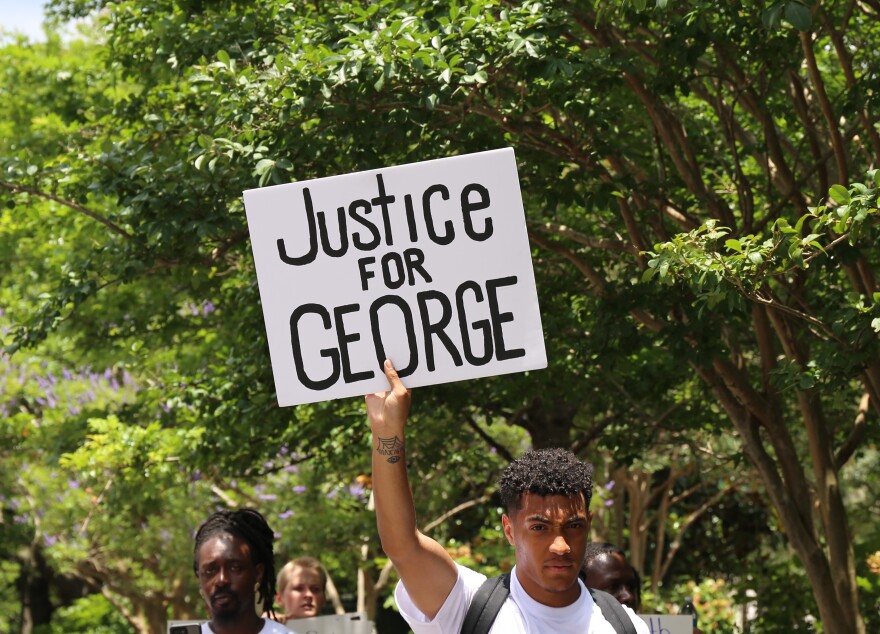
In the months following the unimaginable church massacre at Mother Emanuel AME Church in Charleston, a poet, a journalist and an historian came together to write a book. They wanted to explain to a nation not only what happened, but why.
Why were nine Black parishioners gunned down by a white stranger?
Five years later, the authors of "We Are Charleston" find themselves trying to explain again why more African Americans continue to be killed across the country, repeatedly and publicly, this time by white police officers.
"You think of all that we went through in this town and all that these families went through and this church, that all of this kept happening," says co-author and South Carolina Poet Laureate Marjory Wentworth.
Wentworth had hoped for racial healing following the church shootings, especially since many of the victim's family members forgave the gunman, even as he boasted he killed the people who welcomed him to bible study because they were black.
But fellow author and historian Dr. Bernard Powers says racism is difficult to unravel. It's tangled and deeply rooted in slavery, an institution that dehumanized Black people and justified violence against them.
"This was the license that any white person had before the Civil War to take the life of a Black person who resisted." - Historian Dr. Bernard Powers on slavery
"You know, when you think about it, this was the license that any white person had before the Civil War to take the life of a Black person who 'resisted'," says Dr. Powers.
Powers says the past is always present, especially in Charleston where nearly half of all enslaved Africans were brought to this nation. The church gunman wanted to start a race war. His ideas and ambitions were far from original.
Wentworth saw the parallels between the shooter's words and those of John C. Calhoun nearly 200 years ago. She writes about them in her latest poem made up of direct quotes from both men. Calhoun was a South Carolina statesman and former U.S. Vice President, but he was also one of the chief architects of the argument for slavery.
"They're saying the same thing, just in different ways. It's a conversation about racism across the centuries," says Wentworth.
Racism: it has survived centuries. A belief in white supremacy still lives, whether it's embraced as was the case with the Charleston church gunman or it is more subtle, like the subconscious of a society.

But the recent wave of protests over the death of George Floyd and other unarmed Black men seem to reveal a nation fed up with the steady stream of videotaped violence against Black people. The Minneapolis man struggled to breathe as a white police officer kneeled on his neck.
"What is astounding now is that white people, America is finally listening like we have not been making this stuff up," says co-author and former journalist Herb Frazier. He grew up as a member of Mother Emanuel.
All three writers say they're encouraged by the momentum they've seen in the streets, especially by young people both black and white. But they also feel like they've been here before; on the threshold of change yet waiting. Perhaps the pandemic has created the perfect storm.
"People are unemployed," says Wentworth. "People are angry. People are feeling like, 'what do you have to lose?'"
People are paying attention, and the face of the nation is changing.
The U.S. Census Bureau estimates the majority of the population will be nonwhite by the year 2050. Dr. Powers says such impending diversity strikes fear in those who hold onto a narrow view of America. But diversity can make room for a variety of differing views.
"Racial integration was all about bringing people in and then listening to them and allowing them to have a voice in transforming this American mosaic," says Dr. Powers.

Consider the recent removal of confederate monuments. The "We Are Charleston" authors never thought they'd see the statue of John C. Calhoun come down, just down the street from Mother Emanuel. But last week, it did.
What the nation needs now, the authors contend, is empathy.
"Care for one another," says Frazier. "Appreciate one another. Appreciate diversity. Don't be afraid of diversity. You might learn something."
A journalist, an historian and a poet all sought hope in writing a book about one of Charleston's darkest hours.
"We're all going to keep hope alive," says Dr. Powers with a smile.
The Charleston authors are still hoping for racial healing, equity and reconciliation.


